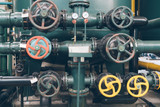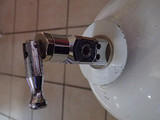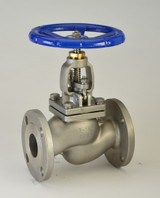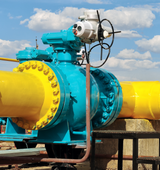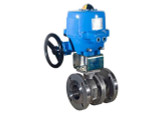Stainless Steel Ball Valves
Thanks to how durable and reliable they are, stainless steel ball valves are some of the most sought-after types of valves across a variety of industries. At ValveMan, we sell a wide variety of such valves. Whether you need a 2-way valve with compression ends, or something completely different, you’re bound to find the right valve for your project with us!
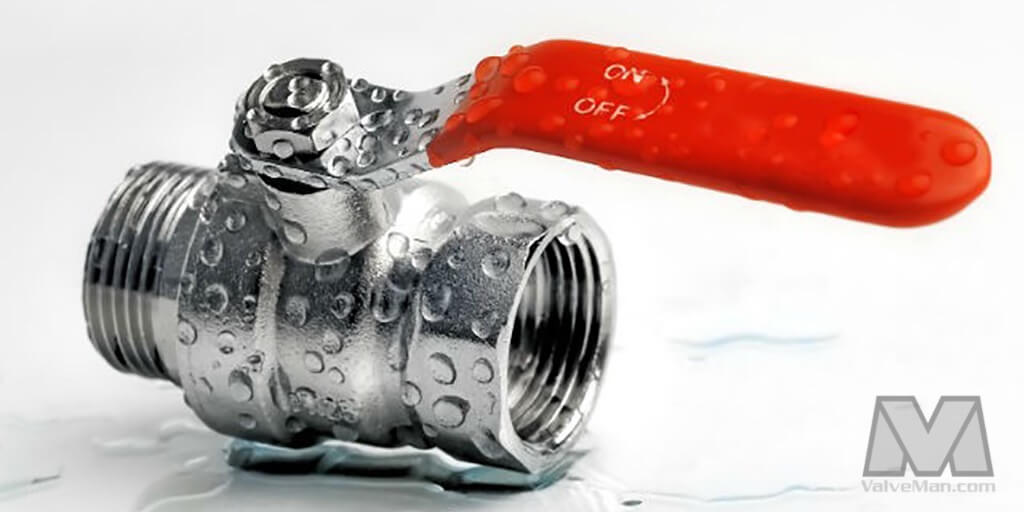
What Is a Stainless Steel Ball Valve?
Stainless steel ball valves are the go-to choice for many industries due to their durability, reliability, and versatility. These valves, as the name suggests, feature a stainless steel ball inside the valve body that controls the flow of liquids or gases. With a simple quarter-turn operation, they offer tight shut-off capabilities and precision control.
How Do Stainless Steel Ball Valves Work?
The working principle of stainless steel ball valves is straightforward. Inside of the valve body is a stainless steel ball with a hole bored through it, that ball is then attached to a valve stem which can be connected to a manual valve handle or an actuator. When the handle or valve actuator is in the open position, the ball is rotated to be parallel with the pipe and create a clear passageway for the fluid or gas to flow through. In this fully open position, the flow is maximized, allowing for efficient operation. Conversely, when the handle or actuator is turned to the closed position, the ball rotates to block the passageway completely, halting the flow of fluids or gases.
The stainless steel ball valve design also allows for reliable and precise control over the flow rate. By positioning the handle or actuator between fully open and fully closed, operators can fine-tune the flow to meet specific requirements. This capability makes stainless steel ball valves a valuable asset in industrial applications where regulating fluid flow is critical.

Stainless Steel Ball Valves: Most Common Applications
Stainless steel ball valves find widespread use in various industries due to their excellent chemical resistance, high pressure rating, and longevity. They’re regularly utilized in a number of different applications, such as:
- Oil and gas industry: Stainless steel ball valves play a crucial role in controlling and redirecting the flow of oil and gas throughout extraction, refining, and distribution processes. Their ability to withstand harsh environments, high pressures, and corrosive fluids makes them an ideal choice for this industry.
- Chemical processing: Stainless steel ball valves are highly resistant to corrosive chemicals, acids, and solvents, making them indispensable in chemical manufacturing plants. They ensure precise control over the flow of volatile substances and offer long-term reliability.
- Water treatment: Stainless steel ball valves are used extensively in water treatment facilities for controlling water flow and maintaining system integrity. Their resistance to corrosion, even in aggressive water conditions, ensures a safe and reliable operation.
- Pharmaceuticals and biotechnology: The pharmaceutical and biotechnology industries demand precise control over fluid flows during production processes. Stainless steel ball valves offer strict adherence to industry standards, ensuring product quality and safety.
Stainless Steel Ball Valves - Available Sizes
When selecting valves, making the right choice depends on the scope and type of your project. You might need to order stainless steel ball valves in a variety of different shapes and dimensions. At ValveMan, we offer the following size range of these valves:
- 1/8”
- 1/4“
- 3/8“
- 1/2“
- 3/4“
- 1”
- 1-1/4”
- 1-1/2”
- 2”
- 2-1/2”
- 3”
- 4”
- 5”
- 6”
- 8”
- 10”
- 12”
Furthermore, we also have a number of valves with different end connections available, such as:
- Threaded (NPT)
- Socket Weld
- Butt Weld
- 150# Flanged
- 300# Flanged
- Compression
- Tri-Clamp
We also offer automated and manually-operated stainless steel ball valves in a number of different operation variants. Filter through the thousands of valves in our inventory using the handy menu on your left-hand side.
What Are the Advantages of Stainless Steel Ball Valves?
Stainless steel ball valves offer several advantages over other types of valves, making them the preferred choice for many industries:
- Durability: Stainless steel is known for its exceptional strength and resistance to corrosion, ensuring the longevity of ball valves- even in harsh environments.
- Chemical resistance: Stainless steel construction offers excellent resistance to corrosive chemicals, acids, and solvents, making these valves suitable for a wide range of applications.
- High pressure rating: Stainless steel ball valves can withstand high-pressure conditions without compromising performance or reliability, ensuring smooth operation, even under extreme pressure.
- Easy maintenance: The simple design of stainless steel ball valves makes them easy to inspect in a manufacturing setting, as well as maintain and service, reducing downtime and associated costs.
- Versatility: With a wide range of sizes, pressure ratings, end connections, and sealing options available, stainless steel ball valves can be customized to suit specific application requirements.
Frequently Asked Questions
Can stainless steel ball valves handle high temperatures?
Yes, stainless steel ball valves are designed to handle a wide range of temperatures. Depending on the specific stainless steel used, they can withstand temperatures up to 1000 degrees Celsius or more.
Are stainless steel ball valves suitable for cryogenic applications?
Yes, stainless steel ball valves can be specially designed to withstand cryogenic temperatures, making them suitable for applications involving liquefied gases.
Can I automate stainless steel ball valves?
Absolutely! You can easily automate any stainless steel ball valve using pneumatic or electric actuators, allowing for remote control and precise operation.
ValveMan: Your Go-To Place For Everything Valve-Related
If you have any further questions about our stainless steel ball valves, or want to inquire about another product, feel free to reach out to us. Our team will help you find whatever it is that you’re looking for!
Stainless Steel Ball Valves - Related Articles
-320°F Cryogenic Liquid Nitrogen Valve - Buy Valves from ValveMan
Industrial Ball Valves - 9 Questions To Make The Right Choice
Using an Actuated Ball Valve Or a Solenoid Valve For Best Fluid Control In The System
Selecting the Best Apollo Ball Valve for Natural Gas Use
Difference Between a Vented Ball Valve and a Standard Ball Valve
Difference Between a 1, 2, and 3 Piece Valve
Product Profile: 3 Piece Firesafe High Performance Ball Valve
What is the Difference Between Full Port and Standard Porting?
Product Profile: High Purity Ball Valve- Sanitary Type Applications
Our Posts
View AllWhat is a Spool Valve and How Does It Work?
Spool valves are incredibly useful. They are a simple directional control valve used in hydraulic an …
Read MoreWhat is the cracking pressure of a check valve?
Check valves, regardless of their individual design, serve the specific purpose of permitting the fl …
Read MoreSmart Water Valves: Futuristic Flow Control Technology
Leaks can range from annoying to devastating, and the longer they go unaddressed, the more costly th …
Read MoreHow to Calculate Flow Rate In Water Systems
Flow rate is critical in water systems, from simple home plumbing to complex industrial water system …
Read MoreWhat Is a Valve Pressure Rating? Definition and Guide
Pressure ratings are important considerations when designing a system that uses valves, but they can …
Read MoreSpecial Pricing and Services for OEM - the ValveMan Valve Store
OEMs or Original Equipment Manufacturers make up a large portion of our clients at ValveMan. With th …
Read MoreData Cooling Centers and Sanitary Valves
Overheated data centers pose a massive challenge, and the global data center cooling market is growi …
Read MoreValve Materials for Gaseous Oxygen Service
Oxygen may seem safe because it is colorless, tasteless, and odorless, but in the wrong conditions, …
Read MorePneumatic Actuators Valve Types
Have you ever stopped to think about what makes an automated assembly line push, pull, lift, and rot …
Read More-320°F Liquid Nitrogen Cryogenic Control Valve Setup
Need a valve that can handle -320°F liquid nitrogen without freezing up — and still control flow? He …
Read MoreWhy Fall is the Perfect Time for Valve Maintenance (And What Happens If You Wait)
We're well into fall now, which means it's time for that conversation nobody wants to have: winter p …
Read MoreFrom the DMZ to Bonomi: Rick Wentzel’s Valve Legacy
In the inaugural episode of the Fully Open podcast, host Gil Welsford sits down with Rick Wentzel of …
Read More
Check Valve vs Backflow Preventer Comparison | ValveMan
If you need to make sure that fluid in your pipe system flows in one direction only, and prevent rev …
Read MoreDifferent Types of Gas Shut Off Valves | ValveMan
Whether you're upgrading your residential gas system, looking for the best gas shut off valve for yo …
Read MoreGlobe Valve vs Ball Valve Comparison Guide | ValveMan
Valves are widely used in industrial and manufacturing facilities, but they’re also used in utilitie …
Read MoreNEMA Ratings Explained | ValveMan
Have you ever wondered what that little NEMA number on your electric actuator meant? Or perhaps, you …
Read MoreGate Valve vs Ball Valve Comparison Guide | ValveMan
Valves are widely used in industrial and manufacturing facilities, but they’re also used in utilitie …
Read MoreValve Inspection - Main Points of Valve Inspection and Testing in Manufacturing Settings
Industrial facilities rely on different types of valves (such as gate valves, check valves and ball …
Read MoreCan Ball Valves Be Used For Flow Control?
Ball valves are widely used in plumbing and piping systems, in fact, they are one of the most common …
Read MoreIntroducing Bonomi Valves
The Bonomi Group is a leader in industrial sectors including oil and gas, hydraulics, heating and en …
Read More
 888-825-8800
888-825-8800








